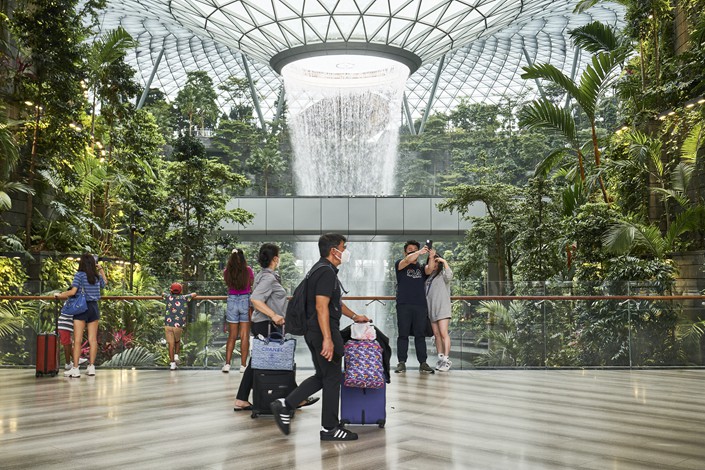
Since World War II, few have doubted the status of London and New York as the international financial and business centers of Europe and America. But arguments abound over which city rules in Asia.
Japan and South Korea are among the largest economies in Asia. Tokyo and Seoul, their capitals, are two of the most important cities on the continent. However, as English is not popular in either, they have never been the first choice for multinational companies’ Asian headquarters. This means the two cities have only ever served as regional financial centers in their own economies.
English is widely spoken in Sydney. But Australia is too far away from other Asian economies, and its own economy is not particularly large, so Sydney cannot be seen as the most important financial and business center in the Asian time zone either.
With the rise of China’s economy, the cities most likely to become the Asian financial center to rival New York and London are Shanghai, Hong Kong and Singapore. Among them, Shanghai has obvious advantages. It’s the most important industrial and commercial city on the Chinese mainland, with a considerable part of its more than 20 million population speaking English. The total market cap of companies listed in Shanghai was $7.9 trillion at the end of February, which is higher than Hong Kong’s $5.2 trillion and Singapore’s nearly $700 billion. However, the biggest weakness Shanghai faces is the Chinese government’s capital controls and the impact of the limited internationalization of the yuan.
Hong Kong’s greatest advantage is its status in the “One Country, Two Systems” policy. It has a judicial and commercial system in line with international standards. Moreover, the Hong Kong dollar is pegged to the U.S. dollar. The city can also piggyback on the mainland. It has attracted many companies from overseas and the mainland to set up branches and go public there. As a result, over the past two to three decades, Singapore has only surpassed Shanghai and Hong Kong in certain areas, such as foreign exchange trading.
However, since 2019, factors that benefit Singapore’s development have been growing.
Since 2019, the China-U.S. relationship has deteriorated rapidly. It has not improved significantly despite the end of the Trump administration. In the short term, Hong Kong may benefit from certain mainland enterprises delisting from the U.S. and returning to Hong Kong amid the escalating China-U.S. financial war. But geopolitical tensions between the two countries have prevented American investors from buying some Hong Kong-listed Chinese stocks. And then there are voices that question the level of social stability in Hong Kong. Deteriorating China-U.S. relationship is undoubtedly bad for both Hong Kong and Shanghai in their quest to become Asia’s international financial and commercial center.
In addition to these direct effects, deteriorating China-U.S. relations have also accelerated transfers in the global industrial chain. As production costs in China rose, some multinational companies transferred part of production to Southeast Asia. And there’re also uncertainties regarding China’s export tariffs and whether China will still be able to import the most advanced production technology from Europe and the U.S. Therefore, it’s foreseeable that many multinational companies will accelerate shifting new capacity from China to other countries, especially in Southeast Asia. As the financial and commercial development of no other cities in Southeast Asia compares with Singapore, the island state will be the main beneficiary of accelerated development in the region.
Singapore has also benefited from its successful response to Covid-19. Judging from the world’s epidemic prevention and control experience in the past more than two years, no country or region can guarantee its production chains will not be affected by the pandemic. The Chinese mainland ensured stable production through most of the pandemic, but with the outbreak of the highly contagious omicron variant, stable production has become an issue. Also, most foreign companies do not want to integrate production in a single country, so they may shift their industrial chains out of China.
Singapore’s epidemic controls have received many positive comments globally. In mid-2021, it decided to coexist with the Covid-19 virus and has since gradually reduced social distancing and travel controls. That’s very different from the tight epidemic control measures or citywide lockdowns adopted in Hong Kong and Shanghai in early 2022.
Though Singapore has adopted a strategy of coexistence with the virus, health care resources remain plentiful. Fewer than 500 people in Singapore have died of omicron in 2022, roughly the same number of influenza deaths. By comparison, more than 9,000 people died of Covid-19 in Hong Kong. In Shanghai, though the proportion of the population infected is much lower than in Singapore, economic activity in the city has been largely suspended since mid-March due to strict lockdowns, resulting in heavy economic losses. It is expected that Shanghai’s and Hong Kong’s responses to Covid-19 could push large multinational companies’ regional hubs out of China, though the companies may still retain operations that are closely related to the mainland in Shanghai or Hong Kong.
As a result, it’s difficult for Shanghai and Hong Kong to maintain their status as international financial and business centers given strict quarantine and lockdown measures. Singapore, thus, has a comparative advantage. In the future, the development of Singapore deserves everyone’s attention.
Vincent Chan is a China strategist at investment advisory firm Aletheia Capital and a former head of China equity strategy at Credit Suisse.
This article has been edited for length and clarity.
Contact translator Tang Ziyi (ziyitang@caixin.com) and editor Heather Mowbray (heathermowbray@caixin.com)
Get our weekly free Must-Read newsletter.







